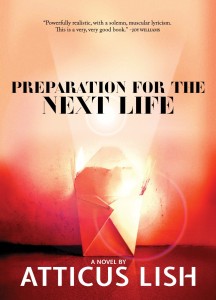 Life at the Bottom of the Food Chain
Life at the Bottom of the Food Chain
The images and details in this novel are haunting. They linger in the mind days after you’re done reading. To me, that’s a sign of good writing.
Here are some passages with the kind of detail that characterizes this book, passages selected literally by thumbing at random:
“Billboards carried hepatitis warnings. Tall blue-black Africans gesticulated, selling something in the street. The way was narrow because of the vendors. A block of squid gelatin hissed on a grill.” (p 49).
“They made her wait. The register girl came in and said, Could you move? Flung her purse on a shelf under the counter. In the back a wok was getting beaten with a shovel. They brought the fish-tofu out. Stinky tofu is mad good, the register girl said, glitter in her wolf hair.” (p. 131).
It’s the story of a youngish Uighur woman illegally immigrated to New York City from China. She speaks only a few words of English at first, and not much Chinese either, which in New York is Cantonese, not the language of the Muslim west where she grew up. She finds horrible jobs in fast food places, where she is horribly cheated, and she sleeps in filthy rented rooms. It’s a heroic story of this woman’s struggle to stay out of jail and survive at the very bottom of the food chain in America.
The book at first seems to be about an Iraqi war vet named Skinner, who, after four brutal tours of combat, suffers from severe PTSD and probably TBI. The story opens with him arriving in New York, just released from the military, so following the rule that the story will be about the first thing that moves, you think it’s about him. He seems like an interesting character, big, strong, hair-trigger rage. His challenge too, is to find food and shelter in the big city.
Early on, he meets Zooey, the Chinese woman, and she dominates the rest of the book while he drinks himself into oblivion amidst dreams and flashbacks about the horrors of the war. While she is all about discipline, hope, and hard work, he is all about self-indulgence and self-pity. Nevertheless, she clings to him because she has, almost literally, nothing else. He at least has a duffel bag with a laptop, a gun, and redundantly, some pornographic magazines. And he’s American, speaks English, and he’s a man. At first it seems like they might form a stable relationship around exercise and body-building, interests they both have.
They hang out together but he’s no good. He breaks promises and goes missing for days then shows up drunk. She becomes angry, refuses to see him, but he begs, so she relents and they make up. Repeat that sequence 25 times and you have the “plot” of the book. Obviously there is no plot.
The characters devolve into repetitious clichés and instead of character development. Fine-grained, street-level detail is substituted, but while it’s vivid, even that gets boring. It’s too bad, because Zooey is an original and interesting character, but instead of showing her, the author merely describes her, repeatedly. Skinner is a caricature from the start and his self-destructive tendencies lead to the obvious conclusion.
Thematically, yes, war is hell, the Iraq war was evil, veterans don’t get the treatment they should, and also immigration is tough, the laws inhumane, and life on the street is a horror. But none of that is really news. What I cared about was the character of Zooey, but that didn’t go anywhere. I’d say the book was disappointing, although I enjoyed the writerly skill of the fine-grained detail.
A block of squid gelatin hissing on a grill. I’m still thinking about that.
Lish, Atticus (2014). Preparation for the Next Life. New York: Tyrant Books (417 pp.).
